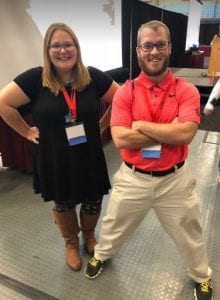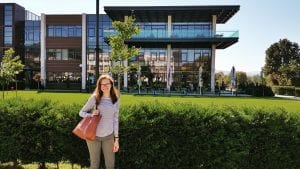Student Spotlight: Bryan Eldridge
Bryan Eldridge
Class of 2019
Elementary Education ELA
Sanford High School
Sanford, ME
UMF CEHR: Why did you decide to go into teaching and did that foster your decision to choose UMF?
Bryan: I realized that I was able to connect well with younger people, specifically elementary-aged children. Once I knew that I wanted to be a teacher and that was where my passion lies, I knew that I had to go to a college that fostered my educational values, leading to my desire to attend UMF. I knew that UMF is a well-known school for education, so I decided that I would apply here and make it my top choice. UMF was the only school I applied to, as it was my top and only choice. I was hoping that I would get in since I had no back-up, but I am so happy I did; it was the best decision I ever made.
UMF CEHR: Why did you choose the specific age group?
Bryan: I want to teach 3rd-6th grade. I want to teach the generation that is coming into their own age, independence, and individuality. These students want independence, but they also need guidance. The pre-teen age group wants to learn at an age that is comfortable for them, and I know that I can provide that while fostering different kinds of learning. As a teacher, I want to be inspirational to my students and leave a lasting impact, encouraging my students to grow up and become successful. Hopefully, my impact on my students will instill knowledge that they will never forget because that is what good teaching means to me.
UMF CEHR: Is there something that you wish you knew about UMF before you came here?
Bryan: Before I came here, I would have liked to know how close the community is here. UMF is a small campus that fosters powerful friendships and great connections. That being said, everything that happens on campus is public knowledge. That is not always a bad thing, but that’s what happens when you are in a small-knit community.
UMF CEHR: Is there something that you would like to share with our underclassmen and prospective students?
Bryan: I would tell all of my fellow UMF students to allow yourself to be a part of as much as you can. Indulge yourselves in these opportunities and challenges that come your way. New things will become available, so join them and be a part of this amazing community. UMF has great resources for all of our students, both academically and socially, so take advantage of it while you can.

Bryan is a CA on campus in the Mallet Residence hall. Here he is pictured with the other CA’s in Mallet.
UMF CEHR: Can you tell me about an unforgettable experience at UMF?
Bryan: Definitely becoming a Community Assistant (CA) on campus. I was hired as a CA for the first time last spring, so this is my first and unfortunately last year as a CA in the resident halls. It urged me to become more involved on campus, but also to make connections with the other CA’s. Being a CA is an opportunity I thought that I would not fit into, but I was wrong. I am more a part of UMF life than I ever was before, and I am so happy about it because UMF is an amazing place. Before becoming a CA, I lived in Scott and Purington, and this is my second year living in the Mallet resident hall.
UMF CEHR: You are student-teaching this semester. Can you explain where you are and why you chose that school?
Bryan: Student-teaching is very exciting because you get to see what it is like to be a teacher every day. I chose to have my student-teaching experience at an elementary school in Auburn. For my student-teaching experience, I really wanted to challenge myself and go outside of my comfort zone. I knew that it was going to be challenging and something that I had not experienced before, but I was okay with that. The school that I am at is very diverse and has a wide range of learners in the student body. There are many students who speak English as a second language. It really encourages me to think over my lessons and how I will make it accessible for all of my students. At the school of my placement, there are 22 different languages being spoken among students. The school also has many low-income students, so that encourages me to inspire my students and be a guiding figure for them. I want to be more than just a teacher, I want to show my students that they matter. I chose Auburn for these challenges because I wanted to learn and work through them before I get a classroom of my own. This experience is giving me the opportunity for growth, as this setting is something that I have never tried before. I could have chosen something more comfortable that I was used to, but I would not be learning nearly as much. This experience is exposing me to new areas, and I am so thankful to be where I am.
UMF CEHR: What is the classroom setting like? Do you teach all subjects or just one?
Bryan: As a fourth-grade teacher, we are responsible for teaching every subject in the classroom. My mentor and I take turns teaching portions of the class. Some weeks I will teach reading and writing every day and my mentor will teach math. It often changes who will teach what, but we operate very much like a co-taught classroom. During the week of March 3rd, I taught math every day to the whole class. It really gives me the opportunity to connect with students and understand how to differentiate my instruction. When I am not teaching, I go to other classrooms and observe teachers. The teachers have very diverse teaching styles, and I want as much exposure to varied instruction as I form my own teaching style.
UMF CEHR: Since you are in your last semester of school at UMF, you will begin looking at jobs soon. Have you started this process, and what advice do you have for others? Do you know where you would like to teach?
Bryan: There are online websites that have job postings in your areas, such as schoolspring.com and servingschools.com. A lot of places do not start posting and looking for new teacher openings until late March and early April. I have started to look, but I know that more will come up as time goes on. I would love to stay in Maine and teach in Cumberland County, but I am open-minded and will take what comes my way. A big piece of advice is to always keep building your resume and skill sets. Apply to as many places you can for the opportunity for growth and success. I attended the career fair last week. The career fair was an excellent opportunity to present myself to prospective schools and prepare me for success in the future. I would encourage anyone looking for a job in education post-graduation to attend the fair. All student teachers were required to attend. Schools came from all over to look for prospective hires. They often conduct small interviews as they get to know students that would make great additions to their schools. I love UMF’s teaching program because it is all about scaffolding. They provide support for students and slowly break away from the scaffold, allowing the student-teachers to do most of the teaching by the end.
UMF CEHR: We have current students who are not yet at the student-teaching phase, as that is typically the “last hoorah” of the education program. Can you tell our students who might be leading up to this experience what it’s like?
Bryan: The student teaching process starts about a year before student teaching. In order to get into practicum, you must pass Praxis I Core. For student teaching, you must have already passed Praxis II at least six months prior to student teaching. GPA requirements must be set, credits completed in the education program, meeting candidacy in order to get into student teaching. Once all of those requirements are met, you will meet with the director of field services, discussing where you would like to be placed. There is a lot of anxious waiting involved, but that is all part of the process. The field supervisors are tasked with placing students where they believe will be the best fit. About a month and a half before student teaching, you will meet your mentor. It is required that you meet with the mentor before the experience starts, and that is a good chance to get any of your burning questions answered.
UMF CEHR: Is there something you wish you knew about student teaching beforehand?

The UMF’s Aspiring Educators of Maine (pictured) hosted a literacy awareness program and brought in UMF’s Assistant Director of Upward Bound, Elyse Pratt-Ronco to speak about overcoming challenges that came up in various children’s books.
Bryan: Before beginning student teaching, everyone knows that it is overwhelming and lots of work going on, and I would say that is true. People often get caught up in the fact that it is work-heavy and forget to mention how much of an amazing experience it really is. Student teaching is a supportive environment. You mentor will support you, your supervisor will support you, and your peers are there for you along the way. There will be help along the way; you are not expected to do this experience all alone. I remember the good part of the support and how I am improving and growing. These are great experiences to be enjoying, so soak it all in. I commute over an hour to school every day, which can be a lot at times, but it allows me to debrief on my way to and from school each day. It is such a rewarding experience to see growth and learning taking place with students.
UMF CEHR: What makes student teaching so different from your two practicum experiences?
Bryan: During my first practicum experience, I got to experience what it is like as a teacher in a classroom; it was a preview of teaching. My second practicum was more hands-on with lesson planning and engaging with students, it included more of my signature teaching style. Student teaching, well, it is something new every day. I love that because every day brings a new challenge and opportunity. It is the full experience of being a teacher. Last week, towards the beginning of the month, I felt that I really indulged myself full feet into the experience. I was the only one teaching all week long. During my full week of teaching, I was teaching all subjects in the classroom. It was really challenging but a great learning opportunity that benefited both myself and my students. In the following weeks, I observed more. I truly believe that student teaching is more what you make of it. As a student teacher, you get to plan and communicate with your mentor teacher, which makes things enjoyable. When I exit the classroom to go observe, I get to see different learning styles and compare, which helps me discover what I would like to and might not choose to include in my own teaching style.
UMF CEHR: Can you tell me about your two practicum experiences?
Bryan: My first practicum experience was in a 4th-grade classroom in the Belgrade area. I was able to do a lot of observations. I also got to see what it is like to be a teacher for the first time. My second practicum experience was also in a 4th-grade classroom, but this time, I was in Madison. I had never been to that region of Maine, so it was something new that I got to explore. The community was well brought together. Each practicum brought something new. During my second practicum, I had an amazing mentor that gave me amazing feedback, but also let me foster my own teaching style. I am in 4th grade again for student teaching; it is an age group that I love dearly. If I could give advice to students who are beginning this journey, explore other grades and substitute teach; it gives you a good idea of what to expect.

Bryan (pictured in the back) attended the MEA fall conference hosted at the Samoset Resort in Rockport. Pictured is UMF’s Aspiring Educators of Maine club that Bryan was the president of.
UMF CEHR: Bryan, you were the President of UMF’s Aspiring Educators of Maine. How did your experiences as a member of the club help you as an aspiring educator?
Bryan: I was the President of the Aspiring Educator of Maine club last semester. I have been a member of the club since my freshman year. The club fosters a great community and I find myself always learning from my fellow aspiring educators. The club has been an amazing influence on me and my future, as I learn practical leadership skills that will help me become a successful educator. I have learned that education impacts more than just the classroom. I have been getting involved in leadership conferences and opportunities that I would not be able to experience otherwise. My second year, I was not as active on the club. Right now, I stepped down as president. I wanted to focus on student teaching, but it is great to see how the club is run not as a president. I personally think that they are doing a fantastic job.
UMF CEHR: Do you have a favorite course that you have taken at UMF that has changed your outlook on teaching? Why?
Bryan: I took Screenwriting with Bill Mesce last year as English credits for my concentration. I took his courses back-to-back and they were some of the most amazing courses I have taken here. Dr. Mesce was so funny and relatable, as I found myself easily engaged in the course. During the course, we were reviewing many movies. One of the courses was on Blockbuster movies from each decade, starting from the 1960s to present. The second course, we were reviewing classic American Thrillers. It really taught me how I might appropriately use film to further learning in the classroom.
UMF CEHR: You mentioned instructors that changed your outlook on your education. How will you foster that for your students?
Bryan: One big part of educational philosophy is creating an environment where students are being inspired and influenced every day; where they can be creative and show their true selves. I want my students to be as successful as they can be, helping them reach their future goals. My teachers and professors have inspired me through their passions and content. I want to correctly use the material to inspire students. My favorite subject to teach is writing. Writing has always been a strength of mine, as it was a great escape for me. It allows students to express their thoughts and feelings, and I think it is very important to provide that space and time for students to think critically.
UMF CEHR: Have you had experiences so far with your (past) or present students that have changed their outlook on school?

The UMF Aspiring Educators of Maine club pictured before attending a dance at the MEA fall conference in October 2018.
Bryan: Being able to substitute teach in my hometown. My students recognize me and appreciate what I have done for them in the past. It is great to be able to give back to my community and be able to work with students. I love being able to come home to see students that I know I have impacted; it is a special feeling. In the future, I do not think I would want to work in my hometown. I do not think it would have the same vibe as being a substitute teacher. I want authentic relationships in the classroom. I also want to explore something new, just like I did with my student teaching. I really want to go back to Southern Maine to teach. I really hope to stay in Cumberland County, but I love exploring my horizons.
UMF CEHR: If you could give any piece of advice to students at UMF, what would it be and why?
Bryan: I would advise anyone to do what makes you happy. Choose the career path that you would enjoy the most. Do not let yourself be held back by anything. Go for it! If I could do this whole experience over again, I wish I had been able to be a CA for a longer period of time. I would have become more involved with other clubs and organizations, but overall, I am very happy with the things I was able to do.
Bryan is almost done with his student teaching experience and has shared his portfolio with us! Please check out the amazing work that Bryan has done over the course of this semester.
Student Spotlight: Jasmine Corkins
Jasmine Corkins
Washington Academy
Pembroke, ME
Special Education 7-12; Rehabilitation minor
Class of 2021
UMF’s College of Education, Health, and Rehab got a chance to speak with Jasmine Corkins, who is a second-year Special Education Major.
UMF CEHR: Why did you choose UMF?
Jasmine: As a sophomore in High School, I came on a tour through a school program. From my first tour, I absolutely fell in love with the campus and the welcoming community that UMF fosters. I knew that UMF was the right fit for me. I loved the small-town feel, as I come from a very small town, so UMF felt like home. During my junior and senior years of high school, I took a bunch of tours. I could not get enough of UMF. I loved it more and more every visit. I knew that I wanted to be a teacher and this was the best school I could possibly go to for my interests. The ideas and philosophies that UMF fosters are concepts that I truly believe in. I love this school so much that I have been on 17 tours here!
UMF CEHR: Before this semester you were a Secondary Education Major with a concentration in math. Can you tell us why you chose that path?
Jasmine: I never would have thought math would have been my path until high school. My favorite math teacher from my high school (Washington Academy) went here. That teacher gave me confidence that in fact, I was capable of completing math problems and that I could do it. I thought I was terrible at it, but my math teacher gave me the confidence to succeed. As I became an upperclassman in high school, I began taking upper-level math classes. I wanted to support kiddos the way I was supported. I will never forget how my teacher made me feel; I had a newfound confidence that I never had before. Once I got to UMF, I struggled with math. I was less enthusiastic about math and I knew that I did not want to teach something that I was not good at. I started to get down upon myself and pretended that math was my calling, but it was not. I was getting low grades in my math classes and I felt that I could not keep up. My whole outlook changed once I took practicum last semester. I was enrolled in practicum as a Secondary Education major, though. I met the professor that changed my life: Dr. Kate Macleod. Dr. Kate taught a Special Education course, which was a 2-credit course in the Secondary Education practicum block. It touched on inclusive schools and how we, as teachers, can become more inclusive. Dr. Kate talked to me about the possibility of a Special Education minor. That sounded like a path I wanted to take because I love accommodating for all of my kiddos. Dr. Kate then asked me, “Do you see yourself in 40 years teaching a math class?” I did not know my answer. It was hard for me to overcome because I knew my answer was no. I replied, “I guess I wanted to teach math.” Dr. Kate then told me the best piece of advice that I will always live with, “If you are not passionate about what you are teaching, you won’t be happy.” After that conversation, I made my choice. I was going to become a Special Education major because I love teaching students with all different abilities.
UMF CEHR: You mentioned that you were in practicum last semester. Can you tell us about your experience in the classroom?
Jasmine: I had my placement at Mt. Blue Middle School in an 8th-grade math classroom. At the time, I was still a math concentration and got to work with amazing teachers. My mentor was Fred Conlogue, who teaches 8th-grade math. I got to experience co-teaching at its finest. His wife, Tammy Conlogue is the Special Education teacher for their community. Tammy would bring kids over from her classroom into the algebra class. The students were integrated very well, where you could hardly tell that students were coming over from another class. I loved my placement, because it felt like one big group, instead of the classroom being split into different parts. It made my practicum experience amazing. By the end of the practicum experience, I saw growth in the students. I knew that I wanted to be a teacher, but I did not know if doing math was for me. I formed great bonds with the students and knew that leaving my placement would be so difficult. All of the students in the class were focused, as different adaptive tools were used in the classroom to keep the students on task. Being in this placement and getting to experience the rich role of a special educator, my decision to become a Special Education major was finalized.
UMF CEHR: You talked about the role that co-teaching played in your placement and how that solidified your Special Education major. Would you want to work in a school that has a strong emphasis on co-teaching?
Jasmine: Co-teaching worked in my placement and I think that is why I liked it so much. That is to say that it would not work at every school. It really depends on where I end up and what kind of school I teach at. What I like about the Special Education Major is that it allows for all different kinds of styles. I can be a co-teacher, teach solo and bring students back into the classroom, or be a supportive role in some classroom reiterating the points and supporting the goals of the lesson. I want to be a little bit of everything, so for right now, I am glad to keep an open mind about things.
UMF CEHR: Your previous experiences fostered the passion that is driven by your new program. Can you tell us about the best part about your new path?
Jasmine: I have not had much experience yet in my new program, but I love it so far. I officially made the switch about three weeks into the current semester. I am taking a lot of special education courses this semester, so I will find out what my favorite parts are! Right now, I am taking an Assistive Technology course taught by Dr. Kevin Good. In that course, we get to learn about different technology tools that we, as educators, can use to support our students in the classroom. I like learning about all of the devices and how they can support students in different ways.
UMF CEHR: Jasmine, you mentioned that you are taking a wide variety of Special Education courses this semester. Do you have a favorite or one that resonates with your teaching style?
Jasmine: My courses have changed my outlook on teaching for the better. I mentioned that I took a Special Education course with Dr. Kate that talked about inclusive schools, which got me excited about Special Education. I am taking a literacy course right now, which analyzes texts and learning how to use different techniques and strategies. This course is taught by Dr. Karen Smith. After being in this class for a little over a month, I have learned about studying for a teaching point of view. It has opened my eyes to different types of studying. I have always considered myself to be really bad at studying, so in a sense, I have been learning how to study. This course really opens my eyes to how each learner is different; some students read fast, and others may need more time to read. For reading and analyzing, there are instructional texts for various levels. I believe that textbooks are not written for the age groups, but they are written for the facts. I realized how students get really bogged down with a word-heavy textbook. For some students, the change in the middle of a book with lots of pictures is a hard switch and makes it hard for them to understand the text.
UMF CEHR: Now that you are here, switched your major and doing well in your new program, is there something that you wished you knew beforehand?
Jasmine: I wish I knew how hard college courses were going to be. I did not know how to study or complete the complexity of homework assignments. For me, the transition from high school to college was a bit difficult academic wise. It was a lot different and there were moments where I felt shocked with the academic rigor. My math teacher in high school believed in me and gave me courage, but I did not know how hard the math classes were going to be. I did not do well in those courses during my first semester of college. I was frustrated and upset and thought I had done something wrong, but it is part of growing up and experiencing the learning process. For my Special Education major, well, I wish I knew how much I loved the Special Education program before I applied. That is easier said than done, but this program is amazing.
UMF CEHR: Is there something that you now know and want others to know about UMF?
Jasmine: Take time to experience UMF. I got to know amazing people that will be my forever friends. I cherish the moments that I spend with all of my friends and I give credit to the community that welcomes you in with open arms. My favorite experience was presenting at the ACTEM Conference (Association of Computer Technology Educators of Maine) with my practicum block. It was truly an eye-opening experience. I presented my math unit that I had been working on in Dr. Theresa’s Curriculum, Assessment, and Instruction course for about a month before the conference. I made some amazing connections with in-field educators and administrators.
ACTEM was an experience so amazing that I will not be able to replace for a long time. I got some amazing feedback on my work, which helped me grow as a future-educator. Even if you don’t get a chance to present, it is amazing just being there. I got to attend very cool presentations and tbe introduced with new technologies. The other thing that I wish people knew about was dorm life. People told me before I went off to college that dorm life was really hard to get used to and living with other people was going to be difficult. It was a great experience going into the dorms for the first time; it was scary and new. I was alone for the very first time, and I will admit that I had a hard time adjusting for the first few weeks. Once I was adjusted with my new home, it was amazing. The dorms provide a community feeling and how to live with other people. I met many of my friends in my time living in the dorms. I lived in Purington my first year of college and still live in Purington and it is a great dorm building. If you have the experience living in close quarters with others, this might not be as big of a culture shock to you. I am so glad I got to experience the dorms along with everything that UMF has to offer.
UMF CEHR: You mentioned that your concentration was once math. Since then, you have switched to Special Education. Are you keeping the math minor or switching to something new?
Jasmine: I am no longer a math minor. Instead of focusing on one thing, I want to be able to do a little bit of everything to support my students. I am now a rehabilitation minor. That was a spur of the moment, spontaneous decision. I talked with Dr. Karen Smith and she mentioned that a lot of students in the Special Education program pair the Special Education and Rehabilitation programs together, as they complement each other nicely. With my rehabilitation minor, I get to work with people I want to work within a field I want to work in. This was the perfect path for me. I was this decision as an immediate “YES”, this is absolutely what I want. Right now, I am focusing on the courses for my major, but I will be taking classes for my minor coming up next semester in the fall.
Bullying and School Violence
During spring semester, the College of Education, Health and Rehabilitation is sponsoring a series of events about Bullying and School Violence. These are issues that directly impacted many UMF students during their P-12 years and continue to affect them today.
To kick of the series, the documentary BULLY will be shown on Monday February 4th at 6:00 p.m. in Preble 117. This film is deeply moving, and students will find it relatable and thought-provoking. According to http://www.thebullyproject.com/about_film,
“Over 13 million American kids will be bullied this year, making it the most common form of violence experienced by young people in the nation. The documentary film BULLY brings human scale to this startling statistic, offering an intimate, unflinching look at how bullying has touched five kids and their families.”
After the viewing, Dr. Christopher Strople, Assistant Professor of Elementary Education, will facilitate a discussion about bullying and its long term impact.
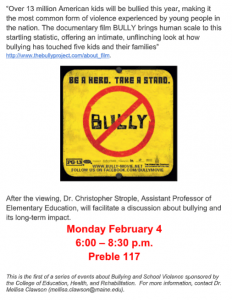
EDU 302 Students at Kingfield Elementary School
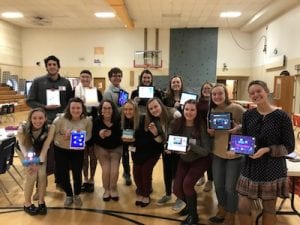
Students from Dr. Swallow’s EDU 302: Technology in K-8 Education class facilitated four stations (Osmos, Wonder Robot, Scratch Jr, Ozobots) at the first ever Math and Computer Science night at Kingfield Elementary School in November. In addition to Dr. Swallow and EDU 302 students, Dr. Good and Eliza Hopkins came with 3d printers and laptops for doing tinkercad design work, and Dr. Lee came to join the conversation.
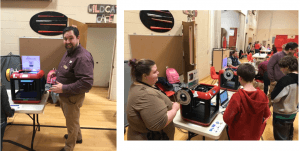
EDU 302 students felt the students, teachers and parents were extremely receptive of the new technology tools and the UMF pre-service teachers. The pre-service teachers also felt they were able to engage deeply with a new technology tool that they might not have otherwise.
A pre-service teacher shared her thoughts about the experience, “I fully believe that this experience enhanced my learning. I was able to use a hands-on approach to learn about something incredible and then determine a way to teach it to others in a fun, interactive way. I also feel that being a part of an event that included not only teachers and students, but parents as well was very beneficial. I feel that experiences like these are important and beneficial for every pre-service teacher.”
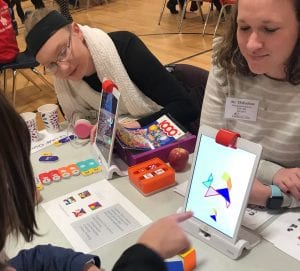 The evening was designed to engage elementary students and families in computer science activities and hosted during the Hour of Code week. The evening was very successful and the teachers loved seeing new ideas for integration into their classrooms!
The evening was designed to engage elementary students and families in computer science activities and hosted during the Hour of Code week. The evening was very successful and the teachers loved seeing new ideas for integration into their classrooms!
Student Spotlight: Gwen Baker
Gwen Baker
Class of 2019
Early Childhood Education Birth-5; K-3
Windham High School
Windham, Maine
UMF’s College of Education, Health, and Rehabilitation Services (CEHR) was able to meet with Gwen Baker regarding her experience at UMF. She shared her insight on her program and how that will help her as a future Early Childhood Educator.
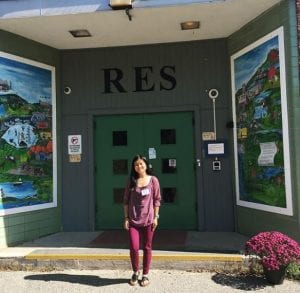
Gwen Baker at her Advanced Practicum experience in a 2nd Grade classroom at Rumford Elementary School.
UMF CEHR: Why did you decide to attend UMF?
Gwen: I chose UMF because when I visited it felt very friendly and welcoming, I really liked that. I felt comfortable at UMF and I wanted somewhere that made me feel that way. I also knew UMF had a history of being a great teacher education school and I knew I wanted the best education possible.
UMF CEHR: Why did you decide to choose the Early Childhood Education program? Do you feel that there is a content area you are excited to teach?
Gwen: I have always loved working with kids but on a mission trip in 2013 I realized just how much. It wasn’t until junior or senior year of high school when I realized I wanted to major in Early Childhood or Elementary Education. I chose Early Childhood because I knew that I wanted to teach the younger children and knew my passion lied within teaching. I enjoy and have strong skills in reading and writing and am excited to show students what they can learn. I am also excited to teach students about nature through theme-based learning.
UMF CEHR: Can you share more about the mission trip you went on?
Gwen: I went to the Dominican Republic to a village called Holonga, where we stayed for a week of the twelve-day trip. In the village, we taught vocational Bible school to children. We would take a story out of the bible and teach it to the children, they would act out the story followed by some activities. We had upwards to 100 children each day. Our leadership group had fourteen teenagers and five adults. We got to play with the students throughout the day, do other mission work and learn about their culture. My work with the children solidified my love for working with the youth. Children have so much to offer and I believe that we can learn from them every single day.
UMF CEHR: You have talked about nature-based education. Can you talk about how that is impacting your philosophy of teaching?
Gwen: Nature is beneficial in regards to teaching. My senior seminar paper is about how nature impacts children’s empathy, care, and kindness. It is more than just bringing your children outside, it is how nature is beneficial. You can teach science by identifying a flower, math by counting the petals and be connected back to reading about the flower types in the classroom. There are many ways to connect nature to the classroom and it gives students an enriched learning experience. Children are playing with mud pies through dramatic play which improves their cognitive development. Nature-based learning is very beneficial and we should make people more aware of the positive impact.
UMF CEHR: Was there a teacher in your life that believed in you and made you want to become a teacher? Can you tell us about the power of a good role model for a young student?
Gwen: I think it is important to be supportive and understanding to all of your students. We get stuck in [creativity] boxes sometimes where we do not allow our students to explore and be creative. If allowed to be creative and explore different things, we are opening up more learning opportunities. It is important that as educators we are not labeling a child for their strengths and weaknesses because it is hard to break from the label. One of my best teachers was my kindergarten teacher, although I did not know that at the time. She was in her first year of teaching and I felt that she really understood every student, understood me, and most of all, communicated with the families. My kindergarten teacher did a great job of differentiating for every student and understanding their needs as a learner. She was kind and patient with all of her students. I think being patient is very important [in an educator] and that was what made my experience in her class so memorable. Having a group of educators believing in you is really powerful.
UMF CEHR: Can you explain a positive experience that you have encountered within your time at UMF in your Early Childhood Education program?
Gwen: One of the greatest moments for me is when I am working with a child, one-on-one or in a group, and they might have previously struggled but after learning in a new way, they just get it. The student pushed and persevered and that is so powerful in itself but you know you helped the student get there! This is special to me because I impacted that student and that makes teaching so rewarding. Just seeing your work reflected on the children has always been a positive experience for me. One story that comes to mind, a second grade student was having a hard time coming up with an idea for a story. He kept saying “I don’t know what to write, I have too many ideas.” I told him to think about instances with his family or friends that you could talk about aloud then asked which one could you really go and go about in writing. The student got really excited about writing his story and it was obvious that he really enjoyed it. He kept putting himself down and felt that he could not do it but once I told him that he could do it, the student had a lot of confidence he could write. It was a really positive experience for me to see.
UMF CEHR: Can you tell us about your practicum experience and how that helped shape you as a future teacher?
Gwen: My first practicum experience was in a pre-K class at a local school and it really helped me learn what it was like to be in the classroom. I got to focus on students needs, planning lessons and learning about the standards. It allowed me to see what it was like to work with students who were four or five. My mentor was great! She suggested I try working with an older group of students, as she thought my vocabulary could be a bit mature for the younger students. My second practicum was in a 2nd-grade class and it was a perfect fit. It was an amazing experience. My mentor and I clicked and were always on the same page. She pushed me and really allowed me to explore to become a better teacher. My third experience was in an infant and toddler placement. They are always learning, too, and there is a lot that they learn but that was harder for me. I think it did lead to me becoming a better educator though, as I was able to see the foundation of what my students are coming from.
UMF CEHR: Can you tell us about your leadership role on UMF’s cross country team and how that will help you become a stronger teacher?
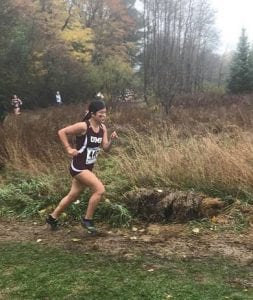
Gwen racing for UMF’s Cross Country team at the North Atlantic Conference championship, held at Troy Howard Middle School in Belfast, ME.
Gwen: There is a lot of things to focus on to have a happy and healthy dynamic team as captain of this year’s cross-country team. t. It is important to make sure the needs are met for each athlete and being aware of what is going on. If you are not together as a team, that will affect how you perform in the races. The same philosophy goes for your classroom. Your students will not efficiently learn what they need to if they are not showing proper leadership. My goal as captain was to be there for each athlete and show them I care. As a teacher, you want your students to trust you and come to you.
UMF CEHR: How does your minor in psychology prepares you to cognitively understand your students as a teacher?
Gwen: Psychology plays a big role and its beneficial because I will be able to understand the deeper reason. For example, why is Johnny acting out during morning meeting? He wants to participate but is there something going on behind the scenes, maybe at home. I am able to gauge the reason why and understand that a bit better. My minor will help me know what to do, how to be proactive and what resources to use to best help my students!
UMF CEHR: Being a senior, what do you hope to get out of your program and what do you hope to still learn?
Gwen: I hope to go into a classroom confidently knowing I will make a difference. We all have those moments of doubt, but to know that I am doing the right thing. Understanding how to manage everything; curriculum planning, engaging with families, and classroom management. Communication with families is super important. You can be a great teacher but if you do not communicate with the families that might impact your success as a teacher. If you do not understand what backgrounds and situations your students are coming from it makes it hard for you to teach mindfully. It is not going to be easy. There are things that you are going to be confident in and others not so much. Some years there are going to be classes you are challenged by and some years will be a breath of fresh air. Understanding that every student is going to be different and they are all able to learn. Students might not always be where you want or need them to be but all of that is part of teaching. I need to remind myself that the good and bad days will be there and I can do it.
UMF CEHR: Can you share some advice for underclassmen, who have or have not taken a practicum, on how to build that special student- teacher mentor relationship?
Gwen: Keep communication open. Communicating puts you out there and don’t be afraid to ask questions. As pre-service teachers, we are always learning from our mentors. Time management is important so I had a folder for each class to write every assignment and color-coded them. It really keeps me on top of things. There are going to be good and bad days but it is important to stay open-minded, true to your heart, and trust yourself. Taking on an extra semester is okay if it means being happy for the rest of your career. What matters is your education and what you want to do. Do not be afraid to speak up if there are legitimate concerns. Cherish your time here and take your learning to heart. Everyone wants you to succeed so take their feedback and see how you might improve.
Alumni Spotlight: Caroline Murphy
Caroline Murphy
Secondary Education English
Class of 2015
ESL Educator- American University Bulgaria
Blagoevgrad, Bulgaria
Recently, UMF’s College of Education, Health, and Rehabilitation Services (UMF CEHR) connected with Caroline regarding her experience in UMF’s Education program.
UMF CEHR: What was the best experience you encountered in your UMF education program?
Caroline: The best experiences during my time in the UMF education program were my two field placements, Practicum, and Student Teaching. I had wonderful mentor teachers who gave me the support and confidence to push myself and it was so exciting to apply everything we learned from our professors in a real classroom.
UMF CEHR: What tips can you give our current students who are going to be entering student teaching?
Caroline: To current students about to enter student teaching, I would say to seize every opportunity to make yourself a better educator. Let your mentor teacher guide you but challenge yourself too. Get involved in the school community, meet the other teachers, and form bonds with your students. All these experiences will be so formative for your future career and are the memories you’ll cherish after graduation.
UMF CEHR: What did you do to sell yourself on the job market? What advice can you give our seniors?
Caroline: To sell myself on the job market, I’ve demonstrated the ways my various experiences working with students and living abroad are assets to potential employers. I made connections with other professionals in my field during my Fulbright grant and sought out their guidance when deciding what to do next, It’s important to build your network. To graduating seniors, I would say not to be afraid of challenging yourself and stretching the limits of what you imagine your future will look like. When I entered college seven years ago I never could have envisioned I would receive a Fulbright grant and be living abroad, but we’re all capable of much more than we often give ourselves credit for.
UMF CEHR: How did you gain experience while at UMF to prepare for the outside world?
Caroline: During my time at UMF, I worked as a peer mentor and a writing tutor which gave me experience different from traditional classroom teaching. I graduated with a wide perspective on the various ways I could work in education. I was a faculty aid which helped me develop a formative and valuable bond with one of my professors. It’s important for undergraduates to also seek out opportunities to work with experts in their field.
UMF CEHR: What experiences made your field placements memorable? What qualities did your mentors have that kept on encouraging you to become better?
Caroline: My field experiences were so great because I developed so much, both as a person and an educator, through challenging myself in the classroom. My students were also such interesting, creative, and fun people – they along with my mentor teachers made me look forward to going to school daily.
My mentors were patient as I worked my way through the ups and downs of being in the classroom but also pushed me to move outside of my comfort zone and try different projects and assignments. They encouraged me when I felt defeated and kept me focused on finding solutions to challenges and not giving up. I owe them both so much!
UMF CEHR: Did you teach your content area when you were a tutor on campus? What ages do you teach with your secondary education degree and why did you choose to teach that age group?
Caroline: I was a tutor at the writing center so I got to work hands-on with other students on essays, research papers, and creative projects – all things in the sphere of my content area, which was fascinating for me. I currently teach various ages, between age seven and adulthood! My secondary education degree, even though it wasn’t specifically for ESL as I teach now, gave me the lesson planning, classroom management, and differentiation skills that I use with all my classes here in Bulgaria. I’ve always enjoyed working with young adults the most but teaching so many ages right now is compelling as well.
UMF CEHR: Did you have a specific teacher that inspired you to go into the field of teaching?
Caroline: I had several teachers throughout my middle and high school years who inspired me to pursue a career in education. I’ve always loved writing and the teachers who supported and encouraged me to develop that passion showed me what powerful impact teachers can have in a young person’s life, which was my main drive to become a teacher.
UMF CEHR: What advice do you have for current students related to managing your classroom and building positive student relationships?
Caroline: I think the key to building positive relationships with your students is to find ways to show them that you genuinely care about their well-being and academic success. This will look different for every student because everyone needs validation in a different way, but teaching in both America and Bulgaria has shown me that wanting to be accepted and respected by their teachers in universal with students everywhere.
UMF CEHR: How did you manage the (lack of) age difference to show your professionalism as an educator with your Secondary students?
Caroline: Being just a few years older than my high school students has been challenging – especially in Bulgaria where people constantly tell me that I look too young to be a teacher! Setting boundaries are important with things like social media and classroom behavior, being understanding but firm so my students know they can’t push me around just because I’m young. It’s also important to always conduct yourself with professionalism and maturity as an educator but even more so when you’re a young teacher.
UMF CEHR: Can you tell me about an experience where you pushed yourself outside your teaching comfort zone where some awesome learning happened?
Caroline: During my Fulbright year, I had a few classes that were apathetic and low on motivation so it was challenging getting them to complete even simple assignments. I decided to take a risk and give them a long-term collaborative project about climate change and they ended up completely exceeding my expectations! It was tough for me to invest in something so time-consuming with them because it would have been discouraging if they weren’t responsive. But I promised myself that I would keep pushing to get them involved in the learning until we all got there together and it paid off in the end. The several weeks we worked on those projects are some of my best classroom memories from that year.
UMF CEHR: What is the Fullbright program?
Caroline: The Fulbright Program is an international exchange program sponsored by the US Department of State that funds research, teaching, and study opportunities in over 140 countries, with the goal of promoting mutual understanding and cooperation between the US and these countries. College seniors or recent graduates apply through their undergraduate institution by completing the online application (with transcripts and CV), writing two personal statements, and sitting for an interview with a panel of faculty at their institution. You apply specifically for one country and each country has different opportunities and expectations for their grantees.
I was a Fulbright/America for Bulgaria Foundation English Teaching Assistant (ETA) at a foreign language high school in Pernik, Bulgaria for the 2016-2017 academic year. I taught English literature and communication skills, as well as coached a speech and debate team through an NGO called the BEST Foundation. My Fulbright year was truly life-changing – I made great friends and taught lovely students, traveled to 10 different countries, met my amazing partner, and got to experience an entirely new culture and way of life. It was also a very difficult experience in many ways, as living abroad and teaching in a completely different environment can often be. But most importantly, I challenged myself to live outside of the bounds of what I always thought I was capable of and grew immensely as a person and in my professional experiences.
Since the end of my Fulbright grant, I’ve been teaching ESL to children and adults at the American University in Bulgaria. I also worked for a year as the Communications Director of the BEST Foundation and continue to volunteer with the organization. Teaching ESL isn’t something I had envisioned for myself during college, but Fulbright and living in Bulgaria has completely changed my perspectives and broadened my horizons for the future.
A side note: anyone at UMF interested in applying for a Fulbright grant is more than welcome to contact me at this email address (caroline.murphy@fulbrightmail.org) or find more information at https://us.fulbrightonline.org/fulbright-us-student-program. I personally highly recommend the Bulgaria program and I think a lot of students at UMF have experience that would make them good candidates for an English Teaching Assistantship. Information on the Bulgaria program can be found here: http://www.fulbright.bg/en/
Student Spotlight: Alyssa Leonard
Alyssa Leonard
Class of 2021
Elementary Education: Minor in Special Education with a concentration in Science
Lyndon Institute
Wheelock, Vermont
UMF’s College of Education, Health, and Rehabilitation Services (CEHR) was able to sit down with Alyssa to talk about her journey to UMF and her pathway to becoming an Elementary School Teacher.
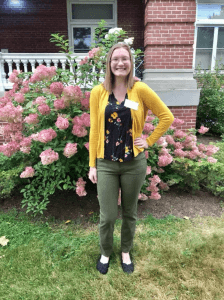
Alyssa Leonard standing outside of Mallet Hall before the first day of her practicum experience at Dirigo Elementary School in Peru, ME.
UMF CEHR: Being from out of state, how did you find out about UMF and why did you choose to come here?
Alyssa: My 4th-grade teacher, who I really looked up to, was an UMF alum. When talking about college choices my teacher said how she liked UMF and how it was such a great school for pre-service teachers. I considered it and after talking to my guidance counselor they had nothing but good things to say about UMF for teachers. After visiting, I realized that this university was amazing and it was everything I wanted. One of the things that stood out to me the most was how quickly the students in the teaching programs are able to get in the schools. Most teaching programs wait until the third year of college to get in the schools, where at UMF you are able to work with students in your second year, which is something I really liked.
UMF CEHR: Why did you want to become a teacher?
Alyssa: In elementary school, I had many supportive teachers who made me feel welcomed and safe. School was a place where I was able to be myself and I always felt happy! Hopefully, I can teach students who grow and like to come to school like I did. I want others to experience the positive side of school.
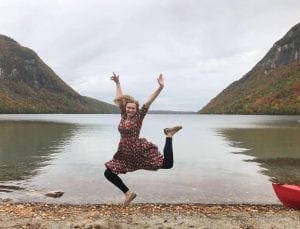 UMF CEHR: What is your best experience at UMF so far?
UMF CEHR: What is your best experience at UMF so far?
Alyssa: I have two experiences [at UMF] that I value: one in teaching and one outside of the teaching world. My best teaching experience is working for Wendy Kennedy in field services. Not only is she so sweet and kind but I am also able to experience the process and mechanics of teaching, as well as getting to see what is ahead that I have to look forward to. My best experience outside of teaching would be being involved with Bust a Move Beavers (BAM) and Dance Team. I am a kinesthetic learner and I love to express myself through motion. It has been such a blessing to find a home in the dance clubs here at UMF.
UMF CEHR: How do you think your minor in Special Education will shape your teaching experience?
Alyssa: My minor in Special Education will help me create a more inclusive classroom. I aspire to create lessons and units for all learning types. My minor will provide me with the tools I will need to succeed in becoming an inclusive educator.
UMF CEHR: What grade do you want to teach and why?
Alyssa: Right now, I want to teach 3rd grade, which is where my practicum placement is this semester. By the age of eight and nine, the kiddos have a lot of fundamentals under their belt and they are also eager to learn. You can do so much with them! I am not completely set on just teaching 3rd grade, I am willing to keep my options open. I might want to explore middle school a bit, so I can teach middle school science. I think the reason why middle school science is appealing to me is the fact that I didn’t have an intensive science curriculum. This would be a chance for me to feel like I’m giving back to an area that I lacked growing up. I would also be willing to teach middle school because they are goofy and at a fun age, but also my students are able to explore more in-depth science content.
UMF CEHR: You said middle school science is something you are passionate about, did you have a teacher who provided a great learning experience in science or is it just a passion?
Alyssa: In middle school, I did not have a positive learning experience with science, but it is a subject that I have always been passionate about. In middle school, we bounced around in science quite frequently. I had a more positive learning experience with science in high school where I learned more. My favorite areas of study in science are environmental science and biology, which are subjects that I would ideally hope to teach.
UMF CEHR: As a Community Assistant (CA) in the resident halls, how does this prepare you for a leadership role as an elementary school teacher?
Alyssa: Being a CA made me develop better leadership skills with colleagues. I get to make bulletin boards in the halls, which are a preview of what I will get to do in the classroom. One of the best things about being a CA is the bonds that I am able to make with my residents. Relationship building is very important to me, which I will be able to do as a classroom teacher, so this is a taste of what it will be like. Residents come to you a lot and as a CA I am able to provide them with advice, help, and other resources. It’s a really good feeling to be someone that your residents trust and can go to if they need someone who will listen and be there for them. Support from home is important for many students and I am glad to be someone who can listen and help them be as successful as possible.
UMF CEHR: As a student in our Elementary Education practicum, can you explain how this experience is helping you grow as a pre-service teacher?
Alyssa: I have made leaps and bounds in my journey to become a teacher. There are things that I could have never imagined that would have never become possible. This experience is so surreal and specific to what I want to do after college as a classroom teacher. Right now in my EDU 333 class, we are working on a 100 book challenge. We are choosing books in different genres: 2 social studies books, 2 science, 10 diversity, 2 math, 3 chapter read aloud k-3, 1 poetry, 1 alternative fairy tale, 1 concept book, 15 non fiction texts, and any others other until you reach 100. This project has allowed me to become more familiar with children’s literacy. In addition to that, we as a class have done work to recommend children’s books for our own library on campus to include in the collection. One of the books I really wanted to include was “How to Code a Sandcastle” by Josh Funk. I really like this book because it has a female represented in a STEM field. It also introduces children to coding! A topic which I think typically is under-represented in literature. In EDU 302, my technology class, we are also experimenting with using teacher blogs and other forms of technology. We are also asked to choose a tech tool (Quizlet, seesaw, snapchat, kahoot) and we must share and present about it. I choose an eSpark which is a tool I have seen my mentor teacher use in class. It’s a super cool tool that my school gets to use from a grant called moMEntum which is a K-3 literacy pilot.
When we met with Alyssa, she had just received her placement the day prior. At that point, she was not sure what to expect, but feeling excited and nervous. Alyssa is excited to explore what methods she may like in her placement and how that will apply to her classroom after UMF. She is eager to better herself as an educator from her mentor and learn from her every day. We followed up with Alyssa and she absolutely loves her practicum placement. She is working closely with her mentor teacher and has been able to implement a few lessons in the classroom including a lesson on long “o” words. In her free time, Alyssa Leonard is involved in an education club on campus called UMF Aspiring Educators of Maine.
CHER: If you could ask alumni a question, what would it be?
Alyssa said that she would ask one thing they regret they did not do here at UMF during their time as a student that would benefit me [Alyssa] as a pre-service educator at UMF.
Here’s Alyssa’s pre-service education blog, so we urge you to go follow her on this amazing journey she’s on!
Facts of Farmington
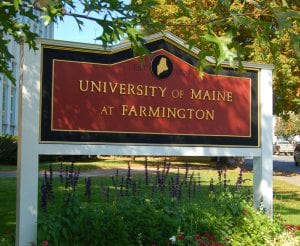 Founded in 1864 as the state’s first publicly funded teacher college and named the Western State Normal School, the school merged into the University of Maine system in 1968, and became known as the University of Maine at Farmington in 1971.
Founded in 1864 as the state’s first publicly funded teacher college and named the Western State Normal School, the school merged into the University of Maine system in 1968, and became known as the University of Maine at Farmington in 1971.
![]() Since 2006, seven UMF Education graduates have been named Maine Teacher of the Year
Since 2006, seven UMF Education graduates have been named Maine Teacher of the Year
![]()
Since 2014, three UMF Education graduates have been named Maine Elementary Principal of the Year
UMF has been ranked among the top schools in the liberal arts and comprehensive college categories by U.S. News & World Report 21 times since 1998.
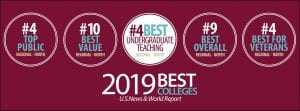
Learn more about our national reputation at http://bit.ly/nationalreputation
There are 1,673 full-time undergraduate students at UMF with a student to faculty ratio of 13-to-1. Creating an environment where you work closely with your professors who will know you by name, and receive their full attention in a supportive, but intellectually challenging one on one environment. UMF offers small class sizes with 64% of classes having fewer than 20 students allowing for individualized attention.
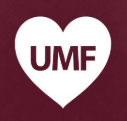 81% of students enrolled at UMF are from Maine, however 18% of students are from out of state and 1% of students are from international countries!
81% of students enrolled at UMF are from Maine, however 18% of students are from out of state and 1% of students are from international countries!
UMF offers a variety of academic programs to study including Art, Business, Education, Rehabilitation Services, Sciences, International and Global Studies, and Pre-Professional Degrees and over 30 minors.
UMF has so much to offer both on and off campus! With over 60 clubs and organizations to choose from; UMF offers it all! For more information about what is offered, click here.
UMF is environmentally friendly:
- In 2016, UMF opened a state-of-the-art Biomass Central Heating Plant heating 83% of campus with Maine wood chips
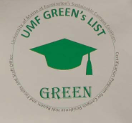
- Opened in 2006, the Kalilow Education Center earned UMF’s second LEED (Leadership in Energy and Environmental Design) Green Building Certification from the U.S. Green Building Council
- UMF made the Princeton Review Top Green College list in 2017, 2014, 2013 and 2012
Learn more about our commitment to environmental stewardship at https://bit.ly/environmental-sustainability

UMF is where many opportunities can begin. To learn more about some of the successful UMF graduates, click here!
Alumni Spotlight: Katie King
Katie King
Elementary Education
Class of 2014
Augusta Schools: 5th Grade Teacher
UMF’s College of Education, Health, and Rehabilitation Services (CEHR) had the chance to connect with Katie King over email to discuss her experiences as a new teacher.
UMF CEHR: What was the best experience that you encountered in your UMF education program?
Katie: The best experience I had at UMF in the education program was by far my professors. I loved the connections and relationships that were formed. Even after your class was over you could still go to any of your professors to get advice or just catch up. They truly cared about me as an individual and about me as an educator. This still rings true today as I still keep in contact with many of my professors. It’s nice to have someone who has been in your shoes as a teacher to go to and troubleshoot or gain ideas from. They don’t stop caring about you just because the class is over or you have graduated.
UMF CEHR: What tips can you give our current students who are going to be entering student teaching?
Katie: For students about to enter student teaching they need to embrace the experience. This will probably be the one and only time you can go in and observe multiple professionals in their classrooms without having to get a substitute. Go visit different grades and special education rooms. If ever you have the opportunity to do a book study or participate in something that your mentor is doing, do it too! That’s a great way to get your name out there and show you are a team player. Finally, have fun! Mistakes will happen, lessons will flop, a kid may throw up but these are all real experiences; learn from them and fully take in everything your placement has to offer.
UMF CEHR: The professors are awesome here! What did you find appealing about the school district that you are currently working in?
Katie: Currently, I work for the Augusta School Department. I moved 40 minutes north of my hometown to teach here because I felt like the district’s goals aligned with my own. They want what is best for their students and that’s my end goal. Augusta also has a handful of teachers who graduated from UMF and those with whom I spoke with said they felt prepared to take on the day-to-day role of a teacher within the district because they offered so much support for first year teachers. They offer a mentor with whom you have weekly meetings, they held sessions for new teachers on how to complete the district assessments, they have a literacy and math mentor who came into my room to help me create and execute lessons for my students.
UMF CEHR: Can you explain a time where something did/did not go well, and how did that help you advance as a newer teacher?
Katie: I will never forget during my first year teaching, I had a student who was having such a hard time with a math concept, multiplying double digit numbers. I remembered from my Math methods classes with Dr. Shannon Larsen a strategy we used and when I introduced it to this student the lightbulb moment happened. Due to the fact I had just taken a class two years prior and was fresh out of school, I was able to use what I learned about different ways to teach students. I then was able to share this strategy with my colleagues and I began to feel more confident with myself as an educator. Being a new teacher doesn’t mean you don’t have anything to offer. I found I had a lot to offer my colleagues, just as much as they had to offer me. UMF prepares us well to be educators, being new may mean you have less experience but it doesn’t mean you’re less valuable to a learning community, in fact you do have a lot to offer.
UMF CEHR: Can you talk about the grade you teach and why?
Katie: I chose to be a teacher because I was inspired by my fifth grade teacher, Mrs. Blanchard. She was a first year teacher teaching a 4/5 combination classroom. Her passion and enthusiasm really inspired me to become an educator. When it was time to student teach, I was unsure of which grades I wanted to teach but was given the opportunity to work in a 1/2 combination classroom. I adored those kiddos, but I was able to see the difference between grade levels and realized I enjoyed the second graders because of their free thinking and independence. When hired for my job there was a 1st, 4th or 6th grade opening. While I was familiar with 1st and did my practicum with 6th I wanted to try 4th. I knew there would be the perfect blend of independence and need. I currently teach 5th grade in the same school I started teaching in 2014. I taught 4th for 4 years until a colleague of mine retired and I had such a great class that I chose to go up to 5th grade so I could keep half of my class. I absolutely love my job and the school in which I work. It’s a small school with only two classes per grade level and I love knowing every students’ name and being able to interact with them, even if they are not in my classroom. What I’ve learned about the upper grades is that while the content is harder they are still kids. They still love to have dance parties, love speaking into our classroom microphone and even enjoy the occasional coloring sheet (a multiplication color by number). The best part about teaching older elementary students is their humor. They are slowly becoming their own person and I get to encourage and guide them through that. I also love being a part of their self discovery while they are finding out the best parts of themselves.
UMF CEHR: What great tips! What did you learn from each grade level that you encountered? For our current students in practicum and student teaching, what advice do you have when exploring different ages?
Katie: I have experienced grades 1, 2, 4, 5 and 6 and each one taught me different things. For example, in first and second grade I realized how important play and imagination were. While they are no longer in Kindergarten these students are still young and need time to explore. Students of this age are extremely busy, and these two years are critical in their development, I’m not lying when I say a lot happens academically for them. One of my favorite sayings to our K-2 teachers is that they taught my students how to read so it’s my turn to teach them to love to read. The upper grades of 4, 5 and 6 are definitely my comfort zone. Their independence level is there and while we are working on advanced academics we also are fostering a social/emotional piece that is different than in the lower grades. These years are critical for students and through social-emotional learning we are helping them realize who they truly are and how to interact with others in a kind way.
My advice for those going into the field is to be open to all grades. Go out of your comfort zone, you learn the most when you are uncomfortable because you are forced to explore more. When I decided I wanted to be a teacher I thought I only wanted the littles but my practicum placement was in 6th grade…at a middle school nonetheless! But I’ll tell you what, I loved every minute of it. While I didn’t get adorable hugs from five year old’s and I didn’t have any funny “kidisms” to share at seminar, what I did get was just as amazing. I got to appreciate the independence of these kiddos mixed with their wisdom, opinions and various interests. I loved the upper grades, I was hooked. But when it came to student teaching I wanted the different end of the spectrum. I wanted to make sure the upper grades were for me. So when I got my placement for a 1/2 combination class I was up for the challenge…or so I thought. After my meet and greet with the students I went home and cried, they were going to eat me alive. But after 16 weeks those kiddos proved to be a dream…I learned so much about how students grow academically and socially from that class. It’s due to the fact I was out of my comfort zone that pushed me so hard to be the best littles teacher I could. If you think you know what grade level you want to teach, do the opposite. Make sure you have as much experience in various levels as you can. Not only does the experience look good on a resume, but it also helps your confidence when you’re in your own classroom. I have 18 students in my fifth grade class but they are not all stereotypical fifth graders. Many act well below or beyond their years so having a wide range of experiences allowed me to better serve them where they are at both behaviorally and academically.
UMF CEHR: What have you learned from your first few years of teaching and how did that help you as an educator?
Katie: Finally, I could write a book about all that I’ve learned through my first few years of teaching. Honestly, there are so many things that I learned that have helped me continuously along the way. But there are 3 very important things I have learned. The first is that we are human; we make mistakes, we care too much and that’s okay because at the end of the day as long as you tried your best and gave it your all, your students learned. The second is to find someone who’s like-minded as you within your building or district. This person will be your sounding board for you, they will push you to be a better educator and you can lean on each other in times of need. As a first year teacher I got myself on a couple of committees and started my grad program for curriculum, instruction and assessment. Did I overextend myself? At times, it felt like it but I had people who were in a similar boat and we pushed each other and helped each other every step of the way. The third thing I learned is that being confident in yourself as a professional is key. Some people may try to think they know more than you or have a better way of doing things but it’s your classroom. Having consistent expectations for students will help make your classroom almost run itself. If someone questions you about why you do something a certain way be honest and confident with your answer. You have gone to school to do this job, you are prepared and you can do this. Never doubt yourself, or worse…never let someone make you doubt yourself. You’ve got this!
Alumni Spotlight: Lindsay Gorman
Lindsay Gorman is a 2018 graduate from UMF’s Special Education program with a minor in International and Global Studies. We had the chance to connect with Lindsay over social media, where she shared her story and all of the great experiences she encountered as an undergraduate student. Gorman has traveled all over the world and is currently working in South America.
Lindsay Gorman
Curriculum and Instruction Coordinator
Special Education
UMF Class of 2018
North Berwick, ME
UMF College of Education, Health, and Rehabilitation (CEHR): What was the best experience that you encountered in your UMF education program and how did that prepare you for your professional career?
Lindsay: Oh that’s a tough one! The best experience I had at UMF wasn’t a single experience, more so whenever I had classes with the Special Education faculty. They all put a lot of energy into their classes that made them so enjoyable. At one point I didn’t think I was cut out to be a teacher, and almost changed majors, and they all encouraged me to stay. Thankful I did, because I absolutely love the field of Special Education! I feel that my experience with them prepared me for my professional career because I witnessed first hand how important it is to build strong relationships with your students.
UMF CEHR: That is so important. I agree that the UMF faculty rocks! How has your UMF career shaped your post-UMF experiences!?
Lindsay: I had the opportunity to study abroad twice at UMF (once on a short term travel course to Tanzania and once for a semester in Ireland with the George Mitchell Peace Scholarship), and with my minor in International and Global Studies, I fell in love with studying other cultures. I decided to take a year off before becoming a teacher and I’m currently volunteering with an educational non-profit in Ecuador! My position is the “Curriculum and Instruction Coordinator,” and I work with other educators on how to improve their lesson planning and make it more inclusive for students with all learning abilities!
UMF CEHR: Wow, that’s amazing! Would you mind sharing how the educational experience varies in those different cultures?
Lindsay: Unfortunately I didn’t get to see schools in Ireland and Tanzania, but I know quite a bit about Ecuador! In my community, the schools are so overcrowded that students only go to school for half the day. For example, there’s a morning group and an afternoon group. The class sizes are huge. My host sister is 11 and has 55 students in her class. The teachers are extremely underpaid and overworked. It’s challenging for the students too because often teaching positions aren’t able to be filled, so they just continue on without a teacher in that subject. So if they don’t have a math teacher, the students just don’t learn math until the school can find one. The program that I work for helps fill those gaps for students, because even if they don’t have a teacher to teach the subject, they are still expect to pass their exams. Even though public education is free in Ecuador, there are still a lot of expenses with schooling, such as uniforms and textbooks. My program also offers scholarships to help with the cost of schooling to our students!
UMF CEHR: It’s surprising yet fascinating how education varies with different cultures. What did you do as a student to be able to land this position abroad? What advice do you have for students aspiring to work in the education profession abroad?
Lindsay: I think minoring in International and Global Studies definitely helped! Even for student who don’t want to live abroad, Maine is quickly becoming more of a multicultural state, so I recommend that minor to all education majors! Taking advantage of the study abroad opportunities definitely helped me as well, because I was able to talk about my previous international experience during my interview. My advice to students who aspire to work in the education profession abroad is to network! I found this position because of a leadership experience I did in high school. The more people you meet, the more opportunities you will have!
UMF CEHR: You mentioned a leadership experience you did in high school. Can you explain what the program was and how that helped you as an education student at UMF?
Lindsay: The program is called the Hugh O’Brian Youth Leadership, also known a HOBY! Farmington actually hosts it every year! It’s an international program for high school sophomores who want to make a difference in their community. The co-founder of the non-profit I work for went to HOBY herself, which is how I got connected! That program not only taught me how to have confidence in myself as a young person, but now as an adult, it has taught me how important it is to encourage our youth to strive for social change regardless of their age.
UMF CEHR: It’s a totally awesome program! It’s great how you were able to build your resume from a young age! What importance does your community have and do you encourage our current students to engage in a similar rewarding experience?
Lindsay: So, our program welcomes all students in the community, and about half of them qualify for the scholarship. Along with the financial assistance, we also provide leadership training and community service opportunities for those students!
UMF CEHR: That is awesome that there is a program that provides that to students. It sounds like your travels play such a big role in your professional career. So far, have you encountered any hardships and how did you overcome those? What are your plans after your year abroad?
Lindsay: The language barrier has definitely been challenging! I studied Spanish for four years in high school but didn’t touch it in college. I’ve also been homesick a bit, so that has been hard as well. However, I’ve been learning more Spanish every day, so I know eventually the language won’t be a problem anymore! When I’m feeling homesick, I just remind myself that Maine will be there when my year in Ecuador is up and I’ll always be able to return there, but I wanted to take the opportunity to go abroad while I still had the chance (before I settled into my teaching career). I’m hoping to teach Special Education when I return to the states, and possibly start a Spanish club at my school!
UMF CEHR: That’s a great way to deal with the stresses. New languages can be hard to learn and adapt to, but it sounds like you have an open mind and willing to learn new things. What you are doing is totally awesome and will give our current students lots of things to consider and think about if they are hoping to go abroad! What was the best advice that you were given as a new employee in the education field?
Lindsay: The best advice I was given was to be flexible. In any field, but especially education, flexibility is so important because so many things can change on a dime! I applied this advice to the classroom, but also my life. I didn’t get the first position abroad that I applied for, so instead of giving up on working abroad, I kept looking and found this one!
UMF CEHR: It’s so great to keep an open mind. Is there anything else that you would like to add for advice to current students?
Lindsay: My last piece of advice is that if you’re even curious about teaching abroad, go for it! There is no better time to go abroad than right after college. Teaching jobs back home will always be there!

